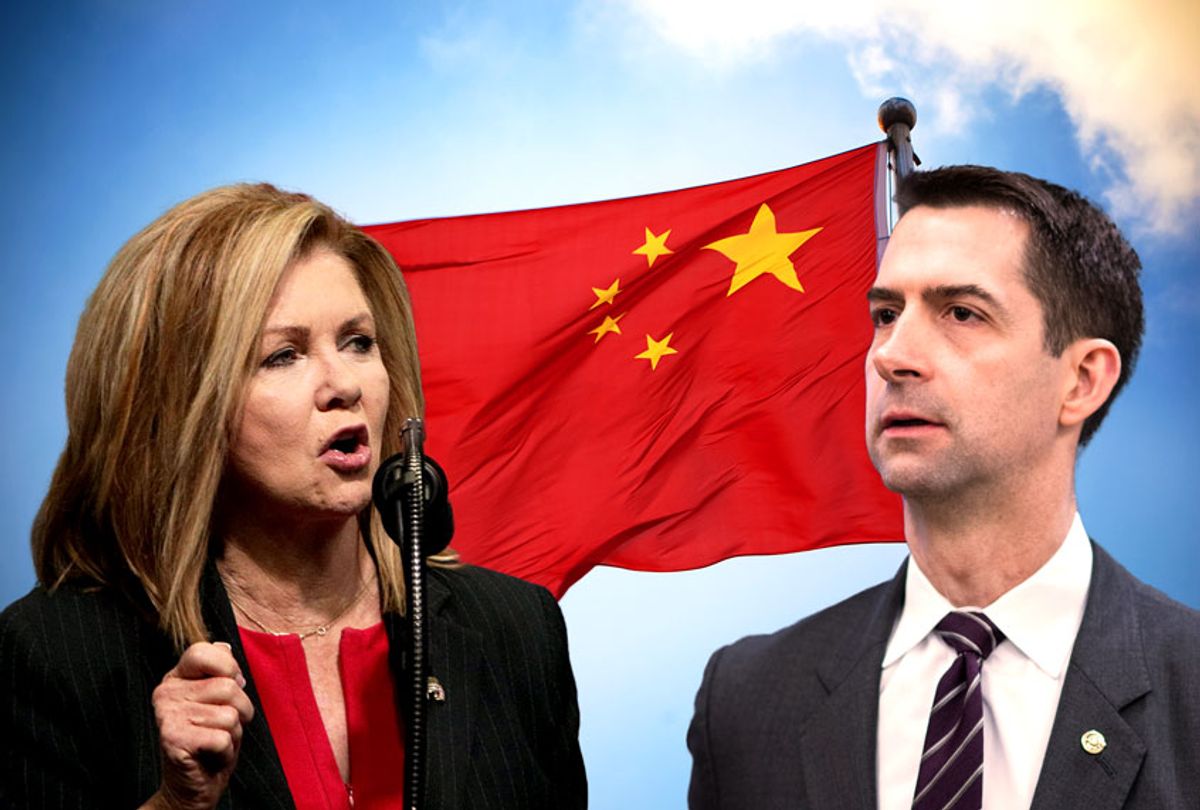From the beginning, President Trump, along with his Republican allies in Congress, have resorted to racist rhetoric to deflect responsibility for their massive incompetence and mishandling of the coronavirus pandemic. Now that more than 104,000 Americans have died as a result of COVID-19 — with the end nowhere in sight — Trump and the congressional GOP are using blatant xenophobia to move the U.S. into an openly hostile stance against China.
After spending months loudly blaming China for propagating the coronavirus pandemic in the U.S., Trump is now turning up the thermostat. Following through on Wednesday's announcement by Secretary of State Mike Pompeo, the president announced Friday he will revoke Hong Kong's favored-nation trading status, essentially treating the city as identical to mainland China and susceptible to U.S. sanctions, even as pro-democracy protests resume. A new bill introduced this week by a pair of Senate Republicans offers another confrontational approach — and amounts to little more than a modern-day version of the infamous Chinese Exclusion Act.
Republican Sens. Tom Cotton of Arkansas and Marsha Blackburn of Tennessee introduced "The SECURE CAMPUS Act," a bill that aims to bar Chinese nationals from receiving student or research visas to the United States for graduate or postgraduate studies in science, technology, engineering or mathematics fields. "The Chinese Communist Party has long used American universities to conduct espionage on the United States," Cotton said in a statement." The SECURE CAMPUS Act will protect our national security and maintain the integrity of the American research enterprise."
Blackburn appears even more eager to agitate for war with China. She recently released a video that claimed "China is not our friend. They are our enemy" and claimed that China "sent this virus to us." She's also floated the completely untenable idea waiving interest payments on U.S. debt to China.
"Beijing exploits student and research visas to steal science, technology, engineering and manufacturing secrets from U.S. academic and research institutions," Blackburn said to introduce her new legislation.
On its face, the bill is a twofer for right-wing extremists: xenophobia with a healthy dose of McCarthyism, complete with a loyalty oath. The bill "requires universities, laboratories, and research institutes receiving federal funding to attest that they will not knowingly employ participants in China's foreign talent recruitment programs." Companion legislation n the House has been introduced by Rep. David Kustoff, R-Tenn.
It's difficult to think of a more efficient way to sabotage U.S. colleges and universities and hobble American competitiveness abroad, while simultaneously breeding xenophobic attitudes at home. Racism and political posturing aside, the most immediate consequence of this bill would be the dwindling research output of major universities. So many American researchers, especially in engineering and science, depend on international students to actually do the experimental work in their labs. Many American academics could potentially lose their tenure track positions if they can't find graduate students and keep up with their research and publication. Obviously, that would be detrimental to "securing U.S. research enterprise" as Cotton himself puts it. It's not like most university-level research is top secret, and as states have slashed budgets for higher education, many U.S. colleges and universities rely heavily on tuition paid by international students.
It's unlikely that this incredibly short-sighted and dangerous bill will get past Congress — but that's not the point. This bill is meant to be a nonstarter among the more corporatist wing of the GOP in order to differentiate Cotton within his party. The Arkansas senator is clearly beginning to position himself as the ethno-nationalist presidential contender for 2024, and perhaps the anointed successor to Donald Trump.
"It's a scandal to me that we have trained so many of the Chinese Communist Party's brightest minds to go back to China to compete for our jobs, to take our business, and, ultimately, to steal our property and design weapons and other devices that can be used against the American people," Cotton said during an April 26 interview with Fox News' Maria Bartiromo. "If Chinese students want to come here and study Shakespeare and the Federalist Papers, that's what they need to learn from America. They don't need to learn quantum computing and artificial intelligence from America."
This bill, along with the administration's action against Beijing this week, serve to deflect from Trump's own troubling ties to the Chinese regime — to say nothing of the actual Chinese spies arrested at Trump's Mar-a-Lago — as Salon's Bob Cesca has written:
While the White House is frantically pointing stumpy fingers at China as the real killers, the Trump Organization continues to do billions in business with China. The top Chinese state-owned bank, Industrial & Commercial Bank of China Ltd., has rented an entire floor in Trump Tower for the last 12 years — at $2 million per month. Ivanka Trump's fashion products rely upon Chinese labor, while the Trump hotel chain has offices in China as well. Meanwhile, half a billion dollars in Chinese money has been invested in an Indonesian project that includes Trump-branded properties.
Trump is shifting the blame and Republicans like Tom Cotton and Marsha Blackburn are carrying his water — ultimately, at the expense of American taxpayers and consumers.
After the Pearl Harbor attack in 1941, the U.S. imprisoned Japanese immigrants (as well as their American-born children and grandchildren) in internment camps, based on the groundless suspicion that anyone with Japanese origins could be a foreign agent. Whil the situation is not precisely parallel, the paranoid thinking involved is about the same. It was wrong then, and it's wrong now.

Shares